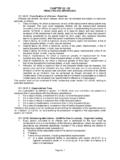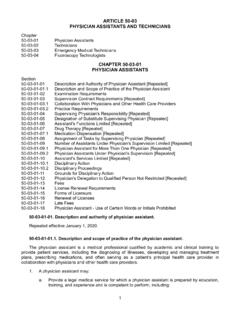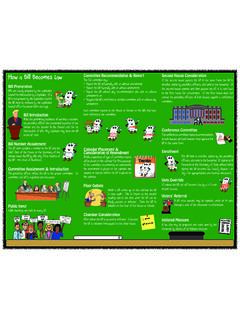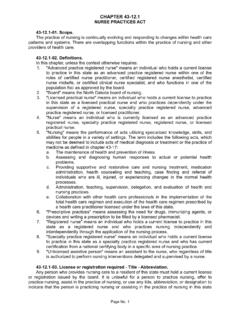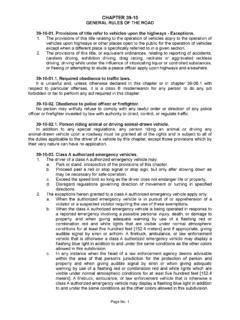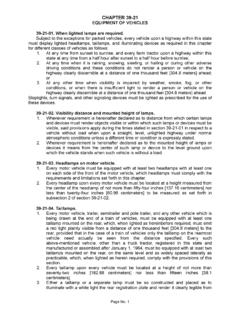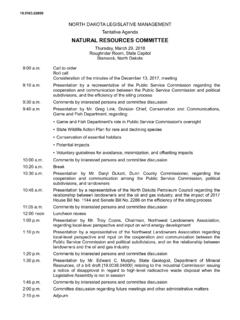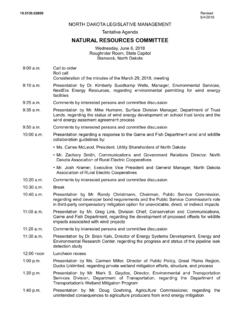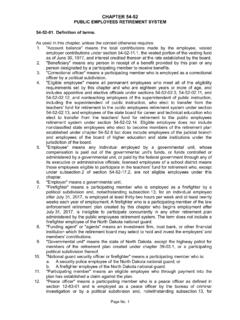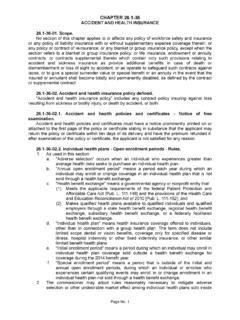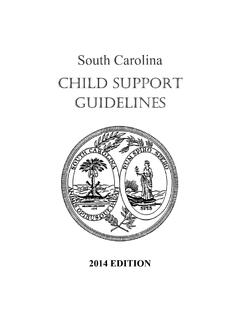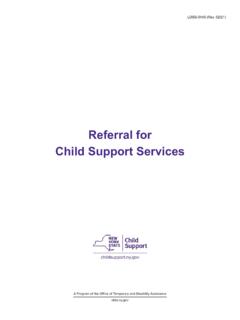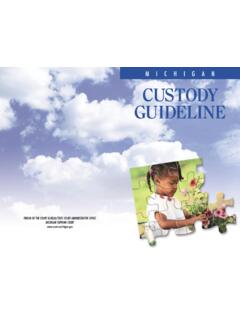Transcription of CHAPTER 75-02-04.1 CHILD SUPPORT GUIDELINES
1 CHAPTER SUPPORT of SUPPORT Amount - General of CHILD SUPPORT Obligation - Split Custody or Primary Residential SUPPORT Level [Repealed] of Net Income From the Cost of Supporting a CHILD Living With the of SUPPORT Amount in Multiple-Family Income Based on Earning of for Extended Parenting Residential Responsibility - determination of CHILD SUPPORT for Rebuttal of Guideline SUPPORT Responsibility for Children in Foster Care or Guardianship " CHILD " means any CHILD , by birth or adoption, to whom a parent owes a duty of " CHILD living with the obligor" means the obligor's CHILD who lives with the obligor most of the "Children's benefits" means a payment, to or on behalf of a CHILD of the person whose income is being determined, made by a government, insurance company, trust, pension fund, or similar entity.
2 Derivative of the parent's benefits or a result of the relationship of parent and CHILD between such person and such CHILD . Children's benefits do not mean benefits received from public assistance programs that are means tested or provided in the form of subsidy payments made to adoptive "Gross income" means income from any source, in any form, but does not mean:(1)Benefits received from public assistance programs that are means tested such as the temporary assistance for needy families, supplemental security income, and supplemental nutrition assistance programs, or that are provided in the form of subsidy payments made to adoptive parents;(2)Employee benefits over which the employee does not have significant influence or control over the nature or amount unless:(a)That benefit may be liquidated; and(b)Liquidation of that benefit does not result in the employee incurring an income tax penalty.
3 (3) CHILD SUPPORT payments;(4)Atypical overtime wages or nonrecurring bonuses over which the employee does not have significant influence or control;1(5)Overseas housing-related allowances paid to an obligor who is in the military to the extent those housing-related allowances exceed the housing allowance in effect at the Minot air force base; or(6)Nonrecurring capital of gross income include salaries, wages, overtime wages, commissions, bonuses, employee benefits, currently deferred income, dividends, severance pay, pensions, interest, trust income, annuities income, gains, social security benefits, workers' compensation benefits, unemployment insurance benefits, distributions of retirement benefits, receipt of previously deferred income to the extent not previously considered in determining a CHILD SUPPORT obligation for the CHILD whose SUPPORT is under consideration, veterans' benefits (including gratuitous benefits)
4 , gifts and prizes to the extent they annually exceed one thousand dollars in value, spousal SUPPORT payments received, refundable tax credits, value of in-kind income received on a regular basis, children's benefits, income imputed based upon earning capacity, military subsistence payments, and net income from purposes of this subsection, income tax due or paid is not an income tax "In-kind income" means the receipt from employment or income-producing activity of any valuable right, property or property interest, other than money or money's worth, including forgiveness of debt (other than through bankruptcy), use of property, including living quarters at no charge or less than the customary charge, and the use of consumable property or services at no charge or less than the customary "Net income" means total gross annual income hypothetical federal income tax obligation based on the obligor's gross income, reduced by that part of the obligor's gross income that is not subject to federal income tax and reduced by deductions allowed in arriving at adjusted gross income under the Internal Revenue Code, and applying:(1)The standard deduction for the tax filing status of single; and(2)Tax tables for a single individual for the most recent year published by the internal revenue service.
5 Hypothetical state income tax obligation equal to eleven percent of the amount determined under subdivision a; hypothetical obligation for Federal Insurance Contributions Act (FICA), Railroad Retirement Tax Act (RRTA) tier I and tier II, Medicare, and self-employment tax obligations based on that part of the obligor's gross income that is subject to FICA, RRTA, Medicare, or self-employment tax under the Internal Revenue Code; portion of premium payments, made by the person whose income is being determined, for health insurance policies or health service contracts, including coverage for dental and vision care, intended to afford coverage for the CHILD or children for whom SUPPORT is being sought, determined by: (1)If the cost of single coverage for the obligor and the number of persons associated with the premium payment are known:(a)Reducing the premium payment by the cost for single coverage for the obligor;2(b)Dividing the difference by the total number of persons, exclusive of the obligor, associated with the premium payment; and(c)Multiplying the result times the number of insured children for whom SUPPORT is being sought.
6 Or(2)If the cost of single coverage for the obligor is not known:(a)Dividing the payment by the total number of persons covered; and (b)Multiplying the result times the number of insured children for whom SUPPORT is being sought; made on actual medical expenses of the CHILD or children for whom SUPPORT is sought to the extent it is reasonably likely similar expenses will continue; dues and occupational license fees if required as a condition of employment; retirement contributions, deducted from the employee's compensation and not otherwise deducted under this subsection, to the extent required as a condition of employment; to documentation, unreimbursed employee expenses for:(1)Special equipment or clothing required as a condition of employment:(2)Lodging expenses, not exceeding ninety-three dollars per night, incurred when engaged in travel required as a condition of employment; or(3)Noncommuting mileage incurred for driving a personal vehicle between work locations when required as a condition of employment, computed at the rate of fifty-six cents per mile, less any actual mileage reimbursement from the employer.
7 Reimbursed out-of-pocket expenses of employment, if included in gross income, but excluded from adjusted gross income on the obligor's federal income tax "Obligee" includes, for purposes of this CHAPTER , an obligee as defined in North Dakota Century Code section and a person who is alleged to be owed a duty of SUPPORT on behalf of a CHILD . 8."Obligor" includes, for purposes of this CHAPTER , an obligor as defined in North Dakota Century Code section and a person who is alleged to owe a duty of SUPPORT . 9."Parent with primary residential responsibility" means a parent who acts as the primary caregiver on a regular basis for a proportion of time greater than the obligor, regardless of descriptions such as "shared" or "joint" parental rights and responsibilities given in relevant judgments, decrees, or "Self-employment" means employment that results in an obligor earning income from any business organization or entity which the obligor is, to a significant extent, able to directly or indirectly control.
8 For purposes of this CHAPTER , it also includes any activity that generates income from rental property, royalties, business gains, partnerships, trusts, corporations, and any other organization or entity regardless of form and regardless of whether such activity would be considered self-employment activity under the Internal Revenue "Split parental rights and responsibilities" means a situation where the parents have more than one CHILD in common, and where each parent has primary residential responsibility for at least one : Effective February 1, 1991; amended effective January 1, 1995; August 1, 1999; August 1, 2003; October 1, 2008; April 1, 2010; July 1, 2011; September 1, 2015; January 1, Authority: NDCC 50-06-16, 50-09-25 Law Implemented: NDCC , 50-09-02(16); 42 USC determination of SUPPORT amount - General as provided in section , calculations of CHILD SUPPORT obligations provided for under this CHAPTER consider and assume that one parent acts as a primary caregiver and the other parent contributes a payment of CHILD SUPPORT to the CHILD 's care.
9 Calculation of a CHILD SUPPORT obligation under section does not preclude a court from apportioning specific expenses related to the care of the CHILD , such as CHILD care expenses and school activity fees, between the parents. An apportionment under this subsection is in addition to the CHILD SUPPORT amount determined by application of this assume that the care given to the CHILD during temporary periods when the CHILD resides with the obligor or the obligor's relatives do not substitute for the CHILD SUPPORT income received by an obligor from all sources must be considered in the determination of available money for CHILD SUPPORT . result of all calculations which determine a monetary amount ending in fifty cents or more must be rounded up to the nearest whole dollar, and must otherwise be rounded down to the nearest whole applying the CHILD SUPPORT GUIDELINES , an obligor's monthly net income amount ending in fifty dollars or more must be rounded up to the nearest one hundred dollars, and must otherwise be rounded down to the nearest one hundred annual total of all income considered in determining a CHILD SUPPORT obligation must be determined and then divided by twelve in order to determine the obligor's monthly net must be sufficiently documented through the use of tax returns, current wage statements, and other information to fully apprise the court of all gross income.
10 Where gross income is subject to fluctuation, regardless of whether the obligor is employed or self-employed, information reflecting and covering a period of time sufficient to reveal the likely extent of fluctuations must be made under this CHAPTER are ordinarily based upon recent past circumstances because past circumstances are typically a reliable indicator of future circumstances, particularly circumstances concerning income. If circumstances that materially affect the CHILD SUPPORT obligation have changed in the recent past or are very likely to change in the near future, consideration may be given to the new or likely future CHILD SUPPORT order must include a statement of the net income of the obligor used to determine the CHILD SUPPORT obligation, and how that net income was determined.
